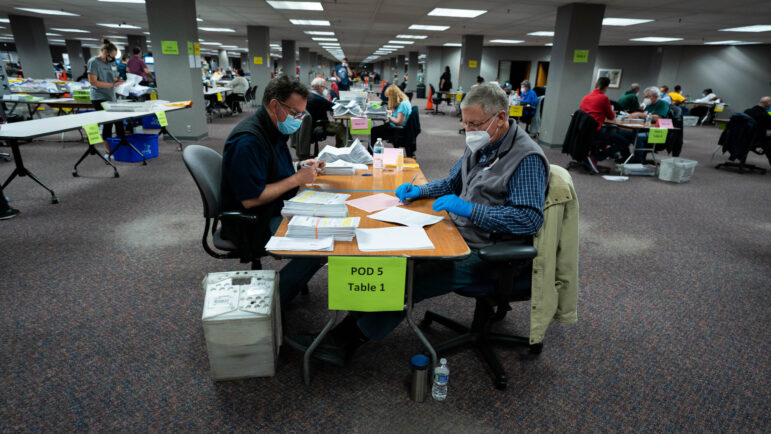Assembly Committee Hears Unsupported Claims of Voter Fraud
A convicted fraudster, who once worked with Michael Gableman, makes wild allegations.

Election workers count ballots at the Milwaukee Central Count location after the polls had closed for the evening, on Nov. 3, 2020. Eric Kleppe-Montenegro for Wisconsin Watch
A so-called “database analyst” presented what he said was evidence of millions of illegal voter registrations and hundreds of thousands of illegal votes in the 2020 election to the Assembly Committee on Campaigns and Elections on Wednesday.
Peter Bernegger, the grandson of the founders of sausage company Hillshire Farms who was convicted of bank fraud and mail fraud in 2009, said he’s been working with thousands of volunteers and a “supercomputer” to find evidence of fraud and misconduct in the state’s voter registration system. Despite repeated requests from Democrats on the committee, Bernegger refused to share further evidence or documentation of his allegations.
“We all know the official reported results, that Joe Biden won by 20,000 votes, but we have 46,000 people who voted and then were not verified by our system — that calls for a full investigation,” Bernegger said. “We’ve also found, using the supercomputer, there’s more than 1.5 million illegally registered voters in our state.”
Court decisions, recounts and investigations have repeatedly found that Biden won Wisconsin by about 20,000 votes and that there is no widespread evidence of fraud.
Bernegger called for a full investigation into his allegations and the dismantling of the Wisconsin Elections Commission. Bernegger has previously worked with former Wisconsin Supreme Court Justice Michael Gableman, who is conducting a widely criticized partisan review of the 2020 election on behalf of Assembly Republicans.
Gableman’s investigation has apparently looked into many of the same issues as Bernegger’s band of volunteers, dragging on for months longer than initially planned and spurring complaints and lawsuits along the way. Earlier this week, a Dane County judge called out Assembly Speaker Robin Vos (R-Burlington) for apparently deleting records related to Gableman’s work.
According to an explanation of the statewide system by the WEC’s technology director, odd entries are systematically examined and the built-in checks can resolve any problems — including duplicate registrations or clerical errors in information such as names or addresses.
“These are some odd entries but they all have a story. People forget (or don’t realize) just how many checks are built into the system,” the explainer, provided by WEC spokesperson Riley Vetterkind, states. “I’d caution that people should apply a critical eye to the spreadsheet snippets and homemade lists circulating. We see a lot of very old and/or inaccurate data being presented as representative of what is in the database.”
Bernegger said there were nefarious actors behind every corner of election administration and the maintenance of the state’s voter lists, allowing thousands of people to cast illegal ballots.
The statewide voter registration list includes more than 7 million entries, which includes years of voters who are still active and many who have been inactivated for various reasons. Despite election officials saying for months that this list isn’t how votes are tracked on Election Day and insisting it isn’t evidence of fraud that active and inactive voter files are stored in the same database, Bernegger repeatedly alleged this leaves the state open to fraud.
“You can see where we have a tremendous amount of inactive registered voters,” he said. “Now this gets to the crux of a problem. We know we have seen it with our own eyes. You could switch an inactive person to active with two clicks. We have seen it with our own eyes. It opens the door to fraud. Anybody in there, you’re talking electronic computer coding. Anybody gets access to the WisVote system, you can go in there, you could flip 100,000 people, vote them, set them back or take them off and nobody would ever know.”
He spent much of his testimony discussing the Electronic Registration Information Center (ERIC), an organization with dozens of member states that use the system to learn when voters move or die. Bernegger alleged that the organization is a plot to give its employees across the country access to sensitive voter information and that it is both improperly providing information and attempting to wrongly register people to vote.
Republicans in the Legislature passed a law requiring Wisconsin to be a member of ERIC and Republican allies previously filed a lawsuit that said the ERIC data is so accurate it must be used to deactivate people’s voter registrations, even if the data wrongly says they’ve moved.
Bernegger also stated that he and his group had filed 450 criminal referrals because of his findings, though he added it was too early to know if any charges would result.
Rep. Janel Brandtjen (R-Menomonee Falls), the committee’s chair and one of the Legislature’s most outspoken election conspiracy theorists, said several times that Bernegger’s testimony was not to be taken as him specifically accusing anyone of fraud and should only be taken as general information. Bernegger’s presentation included several examples of individual voters who he claimed had voted illegally in some way.
“I just wanna make sure you have said that we are looking at this information and we understand that we are not necessarily declaring fraud for anybody,” Brandtjen said. “We are asking questions about the data, the management, the duplication, so I think that [Bernegger] has mentioned several times that we are not claiming on one person, but we do have these questions.”
Rep. Lisa Subeck (D-Madison) took issue with that, saying that Brandtjen and Bernegger were giving different signals with Brandtjen saying these allegations should not be looked at specifically but Bernegger offering a number of specific examples in his testimony.
Subeck and Rep. Mark Spreitzer (D-Beloit) repeatedly asked Bernegger for proof to back up his claims outside of the screenshots of spreadsheets he displayed during his testimony. Bernegger refused, only saying he has “government documents” to verify what he’s saying.
Brandtjen was unbothered by Bernegger’s refusal to share his methods or his evidence, saying she understands why he wouldn’t want to give up the processes in the system he’s worked hard to develop.
“I know you’re being a little private about your process because, like I say, I know it’s taken you a lot of months to come up with it,” Brandtjen said. “I am not aware of the full system itself. But I’ve heard from some of your volunteers of the work that is being done.”
Bernegger said several times that he used the U.S. Postal Service’s change of address database to check if someone had actually moved, even though the Democrats repeatedly said there could be lots of reasons why someone would change their mailing address without changing their residential address for purposes of voting — such as going to college or maintaining a vacation home.
“There’s more innuendo here than there is actual evidence,” Spreitzer said.
With little evidence, felon tells Assembly committee there were thousands of illegal votes was originally published by the Wisconsin Examiner.




















Could this be more flim-flam? But maybe it’s more flim than flam, have to check with the supercomputer. Anyway, just asking the question.